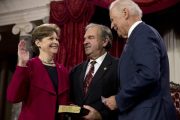
President-elect Donald Trump unveiled key health-related appointments on Friday, rounding out his team with nominations for the Centers for Disease Control and Prevention (CDC), the Food and Drug Administration (FDA), and the position of surgeon general. These appointments highlight his administration’s focus on reshaping federal health agencies.
CDC Director: Dr. Dave Weldon
Dr. Dave Weldon, a physician and former Florida Congressman, is Trump’s nominee for CDC director.
Weldon, an Army veteran and alumnus of SUNY-Buffalo, served seven terms in Congress before returning to medical practice. Known for his conservative views, he chaired subcommittees on Health and Human Services (HHS) and Appropriations during his time in the House.
Trump’s statement outlines the challenge for the CDC director:
Americans have lost trust in the CDC and in our Federal Health Authorities, who have engaged in censorship, data manipulation, and misinformation. Given the current Chronic health Crisis in our Country, the CDC must step up and correct past errors to focus on the Prevention of Disease.
“[Dr. Weldon] will prioritize Transparency, Competence and High Standards at the CDC,” adds the statement.
Vaccine Safety Issues
As a physician, Weldon painted himself as a strong proponent of vaccinations for both children and adults. Yet, he advocated for removing thimerosal-containing vaccines from the schedule, which was in line with the recommendation of the FDA and the CDC issued in 1999.
By 2001, thimerosal, a potentially toxic ethylmercury compound, had been phased out of most U.S. childhood vaccines, except for some influenza vaccines.
Weldon also has expressed skepticism about vaccine safety oversight. In 2007, he introduced legislation advocating for an independent vaccine safety body, citing conflicts of interest within the CDC.
He criticized the CDC for keeping the childhood-vaccine safety data under wraps, specifically those concerning the risks of autism. He called the ostensible consensus about the vaccines’ safety a “sacred cow” that he is challenging to investigate.
Significance
The CDC plays a critical role in managing public health crises, disease prevention, and health promotion. It advises on vaccines, monitors infectious disease outbreaks, and provides evidence-based health guidance. The agency’s decisions significantly affect the health of millions.
FDA Commissioner: Dr. Marty Makary
Dr. Marty Makary, a Johns Hopkins surgical oncologist and author, is slated to head the FDA.
According to Trump’s statement, Makary will “course-correct and refocus” the agency that has so far “lost sight” of its regulatory mission.
Trump praised Makary’s expertise, stating, “Dr. Makary will restore the FDA’s Gold Standard of Scientific Research.” He also said that the commissioner will “cut the bureaucratic red tape,” meaning simplify or remove administrative hurdles and delays that can slow down the processes of approving drugs, medical devices, and other healthcare products. However, while the FDA’s role in ensuring timely access to treatments is crucial, critics rightfully point out that the agency often cuts corners in its evaluations, compromising the thoroughness needed to guarantee safety and efficacy.
Working within the Department of Health and Human Services helmed by Robert F. Kennedy Jr., the doctor will “properly evaluate harmful chemicals poisoning our Nation’s food supply and biologics given to our Nation’s Youth” to address the childhood chronic-disease prevalence.
In an interview in October, Makary blasted the “bad leaders” of the healthcare agencies for enabling the “largest uncontrolled experiment in modern history” that introduced dangerous chemicals into food and drugs.
In September, he testified before the Senate on the issues plaguing the healthcare system and their broader impact on Americans’ health.
Covid
During the pandemic, Makary criticized the healthcare agencies for their “weaponization of medical research” and misinformation concerning herd immunity, masking, and vaccine safety, particularly the risks of myocarditis.
At the same time, two years into the Covid vaccine rollout, he appeared to endorse vaccinations for pregnant women.
Significance
The FDA ensures the safety and efficacy of pharmaceuticals, medical devices, and food. Its decisions directly impact healthcare innovation, patient safety, and the economy.
Surgeon General: Dr. Janette Nesheiwat
Dr. Janette Nesheiwat, a double board-certified physician and Fox News contributor, is President-elect Trump’s choice for surgeon general.
Nesheiwat is a graduate of the University of Arkansas for Medical Sciences. The statement highlights her experience working in urgent care settings in New York City during the Covid pandemic. A bit puzzlingly, though, it also notes that she “helped patients in the aftermath of President Donald Trump’s Historic Operation Warp Speed that saved hundreds of millions of lives.”
Controversies
Dr. Nesheiwat’s nomination was met with sharp criticism over her stances on Covid issues.
Echoing Trump’s enthusiasm for vaccines, the doctor called them a “gift from God” at the beginning of the rollout. Even as the vaccines’ safety issues became apparent, she never retracted the endorsement. Instead, she advised everyone, especially those over the age of 50, to get boosted.
Dr. Nesheiwat also supported masking children at school.
Disturbingly, Nesheiwat praised social media platforms, particularly Facebook, for censoring and removing posts questioning vaccine safety. For her adherence to the official advice and her troubling affiliations, she was quickly dubbed the “female Fauci” on social media.
Significance
The surgeon general serves as “the nation’s doctor,” providing public health guidance and spearheading campaigns to improve health literacy. Though primarily an advisory role, the position has symbolic and strategic importance in shaping public health priorities.
Implications for Public Health
While the nominees have strengths in their respective fields of expertise, their limited administrative experience may pose challenges as they address public health crises, regulatory reforms, and the restoration of trust in health institutions. The success of their declared goals will likely depend on their ability to quickly adapt to the complexities of their respective roles while balancing scientific integrity and political and industry pressures.
Furthermore, none of the nominees has argued that the federal healthcare apparatus is unconstitutional or suggested it should be outsourced to the states. Instead, their focus appears to center on reforming and streamlining federal agencies, rather than dismantling or significantly decentralizing them. This approach underscores an acknowledgment of the federal government’s dominating role in overseeing nationwide health initiatives.





